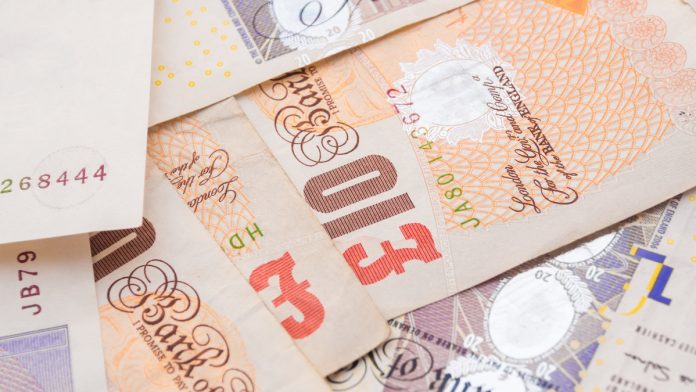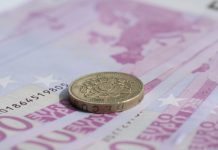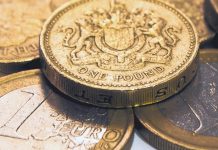The pound fell to lower following the Brexit vote in Parliament. The pound euro exchange rate declined to a low of €1.1415, a significant fall from Friday’s high of €1.1608. The pound has resumed its climb in early trade on Wednesday.
| What do these figures mean? |
|---|
|
When measuring the value of a pair of currencies, one set equals 1 unit and the other shows the current equivalent. As the market moves, the amount will vary from minute to minute. For example, it could be written: 1 GBP = 1.13990 EUR Here, £1 is equivalent to approximately €1.14. This specifically measures the pound’s worth against the euro. If the euro amount increases in this pairing, it’s positive for the pound. Or, if you were looking at it the other way around: 1 EUR = 0.87271 GBP In this example, €1 is equivalent to approximately £0.87. This measures the euro’s worth versus the British pound. If the sterling number gets larger, it’s good news for the euro. |
The UK Parliament voted to rip up UK Prime Minister Theresa May’s Brexit plan as she won backing to return to Brussels to re-open negotiations. The PM has promised to re-negotiate the most contentious part other deal, the Irish backstop arrangement. Theresa May now has two weeks to make progress before facing Parliament again.
The pound tumbled when Parliament voted against the Cooper amendment. This was an amendment that would have given Parliament the legal tools to delay Article 50. Article 50 takes the UK out of the EU on March 29. If no deal is agreed, then the UK will crash out of the EU in a disorderly hard Brexit at the end of March. This is the most damaging scenario for the UK economy and the pound.
Over recent weeks, pound traders had been growing in confidence that a no deal Brexit was off the table. However, the rejection of the Cooper amendment means that it could still be a possibility. This dragged the pound lower.
| Why is a “soft” Brexit better for sterling than a “hard” Brexit? |
|---|
| A soft Brexit implies anything less than UK’s complete withdrawal from the EU. For example, it could mean the UK retains some form of membership to the European Union single market in exchange for some free movement of people, i.e. immigration. This is considered more positive than a “hard” Brexit, which is a full severance from the EU. The reason “soft” is considered more pound-friendly is because the economic impact would be lower. If there is less negative impact on the economy, foreign investors will continue to invest in the UK. As investment requires local currency, this increased demand for the pound then boosts its value. |
As May heads back to Brussels, she will not be met with open arms. Donald Tusk, President of the European Council has been very clear that there is no more negotiation to be done. The EU insist everything there is to say has been said.
Will German Inflation Data Pull Euro Lower?
The euro had a quiet day on Tuesday. With little on the eurozone economic calendar to move the common currency. Today the euro could have a more volatile day, given the high impacting economic releases from the region.
The most highly anticipated release will be German inflation data. Analyst forecast that German consumer price index (CPI) declined -0.8% month on month in January. On an annual basis, analysts predict German CPI dipped for 1.6%, down from 1.7%. German inflation is often closely watched as it serves as a lead indicator for eurozone inflation. If inflation is falling away from the European Central Bank’s 2% target, there is little reason for policymakers to vote to raise interest rates. This could push the prospect of a rate rise back, pulling the euro lower.
| Why do raised interest rates boost a currency’s value? |
|---|
| Interest rates are key to understanding exchange rate movements. Those who have large sums of money to invest want the highest return on their investments. Higher interest rate environments tend to offer higher yields. So, if the interest rate or at least the interest rate expectation of a country is relatively higher compared to another, then it attracts more foreign capital investment. Large corporations and investors need local currency to invest. More local currency used then boosts the demand of that currency, pushing the value higher. |
This publication is provided for general information purposes only and is not intended to cover every aspect of the topics with which it deals. It is not intended to amount to advice on which you should rely. You must obtain professional or specialist advice before taking, or refraining from, any action on the basis of the content in this publication. The information in this publication does not constitute legal, tax or other professional advice from TransferWise Inc., Currency Live or its affiliates. Prior results do not guarantee a similar outcome. We make no representations, warranties or guarantees, whether express or implied, that the content in the publication is accurate, complete or up to date. Consult our risk warning page for more details.
This article was initially published on TransferWise.com from the same author. The content at Currency Live is the sole opinion of the authors and in no way reflects the views of TransferWise Inc.





